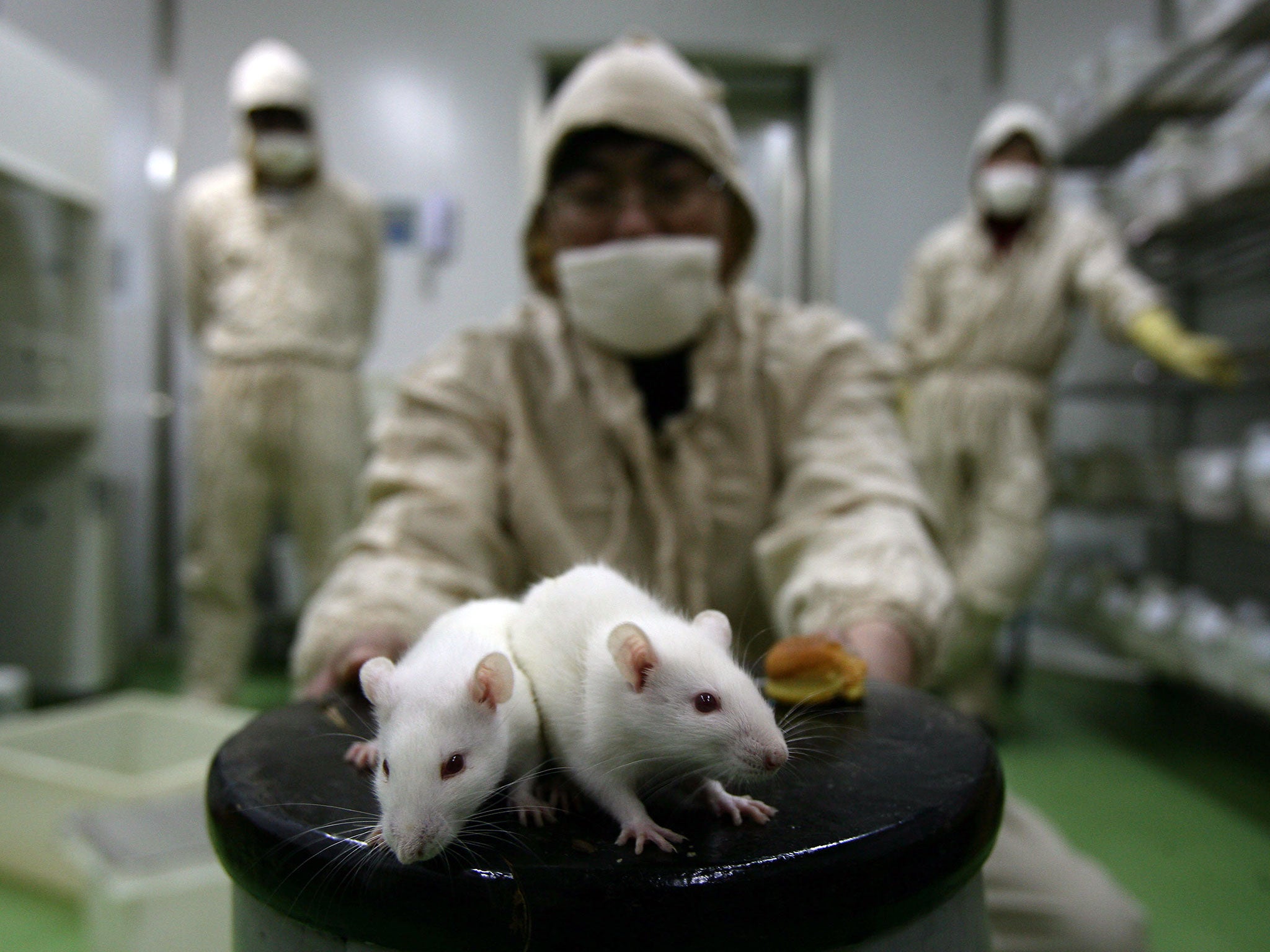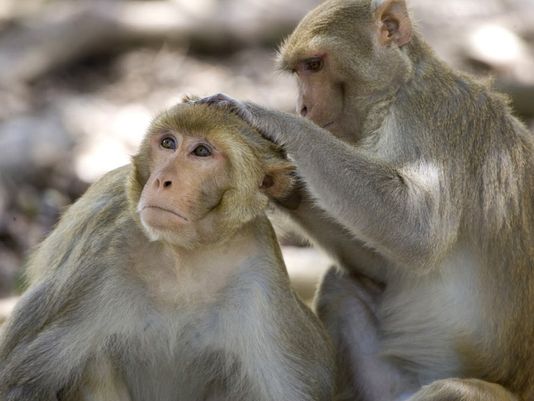Concern over animal testing laws after Brexit, as new figures reveal sharp spike in live monkey experiments
Tests included surgically implanting ‘head-holding’ devices in monkeys in an effort to simulate risky behaviour associated with gambling in humans

Your support helps us to tell the story
From reproductive rights to climate change to Big Tech, The Independent is on the ground when the story is developing. Whether it's investigating the financials of Elon Musk's pro-Trump PAC or producing our latest documentary, 'The A Word', which shines a light on the American women fighting for reproductive rights, we know how important it is to parse out the facts from the messaging.
At such a critical moment in US history, we need reporters on the ground. Your donation allows us to keep sending journalists to speak to both sides of the story.
The Independent is trusted by Americans across the entire political spectrum. And unlike many other quality news outlets, we choose not to lock Americans out of our reporting and analysis with paywalls. We believe quality journalism should be available to everyone, paid for by those who can afford it.
Your support makes all the difference.More than four million procedures on live rodents, monkeys, pigs, horses, cats, dogs and other creatures were carried out by animal testing labs in the UK last year, according to new figures that have been condemned as “sickening and unacceptable”.
Cruelty Free International, an animal welfare group, also said the new Home Office statistics underlined the need not to relax laws in relation to live tests as the Government begins to leave the EU’s regulatory regime post-Brexit.
According to the Home Office’s latest annual report on scientific procedures carried out on living animals, 4.14 million tests were recorded by universities and other laboratories in 2015.
The number represents a small increase on 2013, the last year for which comparable numbers are available.
Of the 4.14 million, 2.08 million were experimental procedures and frequently resulted in significant pain to the animals, while the rest related to the breeding of genetically altered animals.
By far the bulk of experiments involved rats and mice, but the report also details what campaigners say are “worrying” increases in tests carried out on other creatures.
In 2015, 3,600 experiments were carried out on monkeys, up 12 per cent on 2013. One test involved surgically implanting head-holding devices in monkeys before positioning them 30cm away from a computer screen. The test was an effort to try and simulate risky decision-making associated with gambling in humans. The monkeys were made to participate in a gambling task thousands of times over several weeks.
About 4,600 tests were also done on dogs – a drop of 3 per cent on 2013; there were 8,400 tests on horses, a fall of 2 per cent; and there 209 procedures on cats, a decrease of 23 per cent.
The number of live pigs involved in lab tests shot up by 50 per cent to 5,500.
The experiments included tests to satisfy legislation on the safety of food and industrial and household chemicals.
The Government has said it has a longstanding commitment to the so-called three Rs in animal testing: to replace, reduce and refine the number of experiments.
But animal welfare groups believe the facts and figures tell a different story.
Michelle Thew, chief executive of Cruelty Free International, which was formerly known as the British Union for the Abolition of Vivisection, said: “The public will find the increase in animal suffering in British laboratories shocking and sickening.
“The UK should be leading the way in reducing animal testing, yet we remain one of the world’s largest users of animals in experiments. This lack of progress is completely unacceptable, and with recent changes in Government, it is disappointing that there is as yet no minister responsible for animal experiments.
“We strongly urge the Government not to forget animals in laboratories, and to use Brexit as an opportunity to make a real impact in reducing the numbers of animals used in tests.”
Of the 2.08 million experimental procedures in 2015, the Home Office classified about 625,000, or 30 per cent, as “moderate” or “severe”, a figure Cruelty Free International described as “staggering”.

According to Home Office definitions, a severe experiment is one in which “animals are likely to experience severe pain, suffering or distress or long-lasting moderate pain, suffering or distress”.
Under current legislation, live tests on animals are governed by EU directives, but animal welfare organisations say it is not yet clear whether those regulations and standards will stay in place. Cruelty Free International says that while the UK was at the forefront of a number of major advances such as banning cosmetics testing and the use of great apes in the 1990s, EU regulations went further. It cites banning the import of animal tested cosmetics within the EU as an example.
The organisation also said Brussels is currently reviewing its regulations on animal experiments and is looking to strengthen rules regarding the import of primates into the EU.
Dr Julia Baines, science policy adviser for Peta, added: “As Britain prepares to leave the EU, the new Government must commit to maintaining, at a minimum, a ban on tests deemed illegal in Europe and seize the opportunity to become a global leader in innovative science by phasing out tests on animals and investing in cutting-edge non-animal research methodologies. This is the future of science, and for humans and animals, we would do well to seize it.
"Given that the latest Home Office statistics reveal that a staggering 4.14 million scientific procedures were carried out on animals in British laboratories in 2015, we should have a cure for everything, including the common cold, by now were this a useful method of gaining scientific information. What we have done is burn, poison, cut apart, and kill cats, dogs, mice, and monkeys despite overwhelming evidence that such experiments are often the least productive way to try to gain information.
“Today, Britain is one of the largest animal-testing nations in Europe, falling far behind countries that use advance science such as human-on-a-chip, 3D human skin cultures, and high-speed computers that predict far more accurately what will happen in humans.”
Jan Creamer, president of the National Anti-Vivisection Society, said: “With the introduction of advanced scientific methods, we and the public expect to see year-on-year reductions in animal use, so this increase is not what the public wants. The prospect that Brexit could turn the scientific clock back, returning to outdated methods, is a real concern.”
But Wendy Jarrett, chief executive of Understanding Animal Research, said: “The majority of the UK population can accept the use of animals in medical research as long as there is no unnecessary suffering. It is good to see, therefore, that the percentage of ‘severe’ experimental procedures has gone down and that the experience of 82 per cent of animals bred for or used in research is ‘mild’ or below."
And Professor Mike Turner, acting director of science at the Wellcome Trust, said: “Discoveries made through research involving animals underpin many of the medical advances that save lives and improve health on a daily basis. The statistics show that overall the number of procedures involving animals remains at a similar level to recent years. There was an increase in the number of procedures involving non-human primates, such as macaques. These procedures include testing that new medicines are safe and effective, and studies to understand more about the brain and neurological diseases, where close similarity to human biology is essential.
“We support the continued use of animals in research where it is legally, ethically and scientifically justified, and we are committed to developing alternative approaches where possible.”
A Home Office spokesman said the number of “severe experimental procedures” was on the decrease and added: “The UK has one of the most comprehensive animal welfare systems in the world and we are completely committed to the properly regulated use of animals in scientific research, which plays a vital role in improving the lives of people and animals. Animal testing is carried out humanely and only when necessary, with any research undertaken on live animals being strictly licensed by the Home Office and under controls which keep suffering to a minimum.”
Join our commenting forum
Join thought-provoking conversations, follow other Independent readers and see their replies
Comments